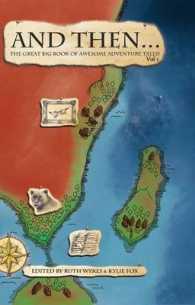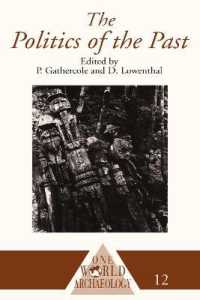- ホーム
- > 洋書
- > 英文書
- > Philosophy
基本説明
Provides a chronologically organised introduction to and summary of Nietzsche's published works, while also providing an overview of their basic themes and concerns.
Full Description
The significance of Friedrich Nietzsche for twentieth century culture is now no longer a matter of dispute. He was quite simply one of the most influential of modern thinkers. The opening essay of this 1996 Companion provides a chronologically organised introduction to and summary of Nietzsche's published works, while also providing an overview of their basic themes and concerns. It is followed by three essays on the appropriation and misappropriation of his writings, and a group of essays exploring the nature of Nietzsche's philosophy and its relation to the modern and post-modern world. The final contributions consider Nietzsche's influence on the twentieth century in Europe, the USA, and Asia. New readers and non-specialists will find this the most convenient, accessible guide to Nietzsche currently available. Advanced students and specialists will find a conspectus of recent developments in the interpretation of Nietzsche.
Contents
Part I. Introduction to Nietzsche's Works: 1. Nietzsche's works and their themes Bernd Magnus and Kathleen M. Higgins; Part II. The Use and Abuse of Nietzsche's Life and Works: 2. The hero as outsider R. J. Hollingdale; 3. Nietzsche and the Judaeo-Christian tradition Jorg Salaquarda; 4. Nietzsche's political misappropriation Tracy B. Strong; Part III. Nietzsche as Philosopher: 5. Nietzsche's kind of philosophy Richard Schacht; 6. Nietzsche's Ad Hominem arguments: perspectivism, slave morality and ressentiment revisited Robert C. Solomon; 7. Nietzsche, modernity, aestheticism Alexander Nehamas; 8. Nietzsche's alleged farewell: the premodern, modern, and postmodern Nietzsche Robert B. Pippin; Part IV. Nietzsche's Influence: 9. Nietzsche in the twentieth century Ernst Behler; 10. Nietzsche's French legacy Alan D. Schrift; 11. Nietzsche and East Asian thought: influences, impacts, and resonances Graham Parkes.








